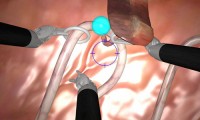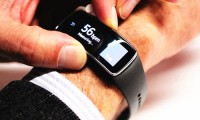-
Explanatory AI system enables more accurate diagnosis of fetal congenital heart disease
- Source: https://www.news-medical.net/news/20220405/Explanatory-AI-system-enables-more-accurate-diagnosis-of-fetal-congenital-heart-disease.aspx
- 1,986
- April 6, 2022
-
Why AI tools are critical to enabling a Learning Health System
- Source: Healthcare IT News
- 886
- January 29, 2018
-
Artificial Intelligence Could Help in Breast Cancer Diagnosis
- Source: healthline
- 846
- December 19, 2017
-
Picture of Health– Can AI Eye Scan Reveal What Ails You?
- Source: livescience
- 1,254
- December 13, 2017
-
China makes use of AI for healthcare
- Source: digitaljournal
- 972
- November 23, 2017
-
For the First Time, a Robot Passed a Medical Licensing Exam
- Source: futurism
- 729
- November 21, 2017
-
Robots and AI Will Take Over These 3 Medical Niches First
- Source: singularityhub
- 711
- November 13, 2017
-
Sanofi Taps into Berg’s AI Platform for Developing Better Flu Vaccine
- Source: researchmoz.us
- 914
- November 8, 2017
-
Wearable Devices–A New Look For The Modern Clinical Trial
- Source: clinicalleader
- 1,190
- November 2, 2017
-
New Use of A.I. Accurately Detected Cancer 86 Percent of the Time
- Source: inverse
- 1,008
- November 1, 2017
your submission has already been received.
OK
Subscribe
Please enter a valid Email address!
Submit
The most relevant industry news & insight will be sent to you every two weeks.













